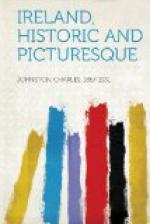“I am willing for His sake to shed my blood, to go without burial, even though my body be torn by dogs and wild beasts and the fowls of the air; for I know that thus I should through my body enrich my soul. And I know that in that day we shall arise in the brightness of the sun, in the glory of the Anointed Master, as sons of the divine and co-heirs with Him, made in His likeness. For the sun we see rises daily by divine ordinance; but it is not ordained to rise for ever, nor shall its light last for ever. The sun of this world shall fade, with those that worship it; but we bow to the spiritual Sun, the Anointed, that shall never perish, nor they who do His will, but shall endure for ever like the Anointed himself, who reigns with the Father and the Divine Spirit now and ever....
“This I beg, that no believer or servant of the Master, who reads or receives this writing, which I, Patricius, a sinner and very unlearned, wrote in Ireland,—I beg that none may say that whatever is good in it was dictated by my ignorance, but rather that it came from Him. This is my Confession, before I die.”
That is the story of the most vital event in the life of Ireland, in the words of the man who was chiefly instrumental in bringing it about. Though an unskilled writer, as he says himself he has nevertheless succeeded in breathing into every part of his epistle the power and greatness of his soul, the sense and vivid reality of the divine breath which stirred in him and transformed him, the spiritual power, humane and universal, which enkindled him from within; these are the words of a man who had first-hand knowledge of the things of our deeper life; not a mere servant of tradition, living on the words and convictions of other men. He has drawn in large and universal outline the death to egotism—reached in his case through hunger, nakedness and slavery—and the new birth from above, the divine Soul enkindling the inner man, and wakening him to new powers and a knowledge of his genius and immortal destiny.
Not less vivid is the sense he conveyed, of the world in which he moved; the feeling of his dignity as a Roman Patrician, having a share of the greatness of empire; the sense of a dividing-line between the Christian realms of Rome and the outer barbarians yet in darkness. Yet the picture he gives of these outer realms is as certainly true. There are the rival chieftains, each with his own tribe and his own fort, and bearing the title of king. They are perpetually striving among themselves, so that from the province of one he must move to the province of another with an escort, led by the king’s son, who receives gifts in return for this protection. This is the world of Concobar and Cuculain; of Find and Ossin, as they themselves have painted it.




